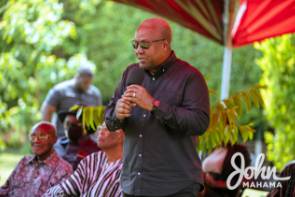NDC Delegates Threaten Boycott Over GH¢40
Former President John Dramani Mahama has recently completed his regional and constituency tours and expressed gratitude to the National Democratic Congress (NDC) delegates. In a thank-you message, he mentioned his intention to give them some amount of money to support their voting efforts. However, delegates in the Sefwi Wiawso Constituency of the Western North Region are threatening to boycott the ongoing Presidential and Parliamentary elections of the NDC, citing the alleged withholding of GH¢40 by the constituency executives.
The delegates have claimed that the GH¢40 was supposed to be given to them by Mahama's campaign team to aid their movement to their various voting centers. The constituency executives are allegedly attempting to deny the delegates the money. One delegate expressed their disappointment and frustration, stating that if the money is not released, they will not vote.
However, the NDC's Western North regional secretary, George Ofori Danquah, denied the allegations and explained that the said amount would be given to the delegates in addition to what the party would have given them as transport fare. He clarified that the party supports the delegates' transport, but the GH¢40 was added to the constituency budget to aid their transportation efforts. He further stated that everything was in order, and he did not understand why the delegates were insisting on receiving the money in cash at hand.
This issue has caused some social media users to question the integrity of the elections and the use of money in politics. Some believe that it is an insult to give delegates GH¢40, while others argue that in true electioneering, nothing should be given. They suggest that the focus should be on being patriotic and contributing to the party/country instead of expecting something in return.
The use of money in politics is not a new phenomenon in Ghana and has been a topic of concern for many years. It has been reported that some political parties offer bribes to voters in exchange for their votes. The Electoral Commission of Ghana has implemented various measures to reduce this practice, including strict rules and regulations for political parties. Nevertheless, the issue still persists, and more needs to be done to ensure that voters are not influenced by financial incentives and that the democratic process is not compromised.




No comments yet
Be the first to share your thoughts!